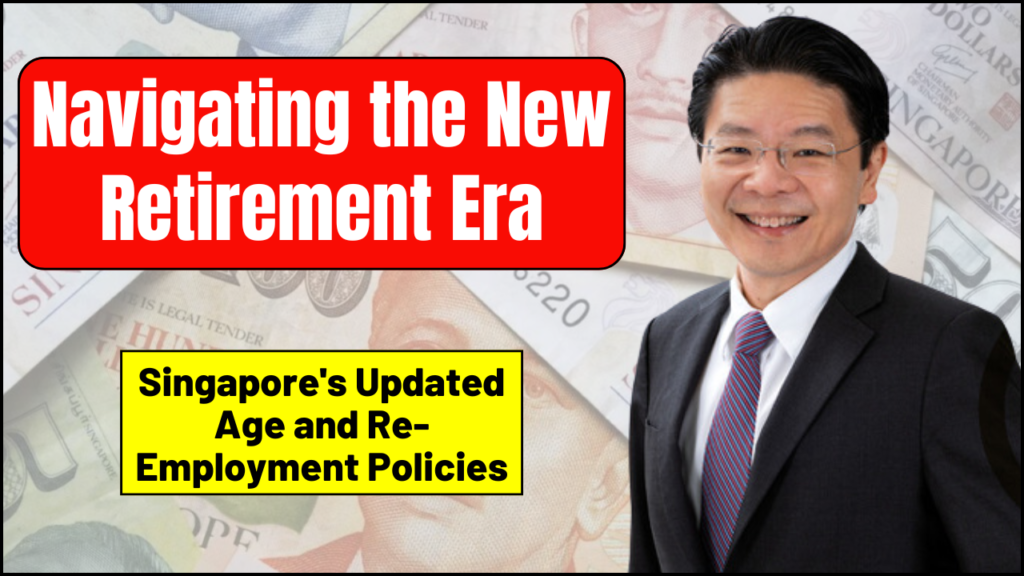
The Singapore government has announced significant updates regarding the retirement and re-employment age to ensure greater financial security for its citizens. These changes reflect a proactive approach to managing an aging workforce while providing older employees with more opportunities to stay employed longer. The revision of the retirement age will directly impact the labor market, benefiting both employees and employers. This article explores the details of these changes, their eligibility criteria, and their broader implications.
Retirement Age Updates in Singapore
The official announcement regarding changes to the retirement and re-employment age was made in 2024. Although these updates will take effect in 2026, the government has already begun its implementation plans. According to the Ministry of Manpower’s Committee of Supply announcement on April 4, 2024, the retirement age will be raised from 63 to 64, and the re-employment age will increase from 68 to 69.
Additionally, the government has projected further increases by 2030. By that time, the retirement age is expected to reach 65, while the re-employment age will extend to 70. These updates align with Singapore’s long-term strategy to support the aging population and encourage older employees to remain in the workforce longer.
Retirement Age and Re-employment Age Changes
| Year | Retirement Age | Re-employment Age |
|---|---|---|
| 2024 | 63 | 68 |
| 2026 | 64 | 69 |
| 2030 | 65 | 70 |
These changes aim to create a sustainable work environment where senior employees can continue contributing their expertise while maintaining financial stability.
S$600 Singapore Cost of Living Payment, Payment Details and How To Check If You Qualify
S$840 – S$900 Monthly Payout in Singapore, Eligibility, Dates & Benefits
Singapore’s 2025 Assurance Package, Eligibility, Deadline, and Benefits
Singapore’s Senior Bonus Payment for 2025, Understanding Bonus Payment
Why is the Retirement Age Changing?
With Singapore’s rapidly aging population, the government has introduced these changes to ensure that older citizens remain financially independent. Studies predict that by 2030, one in four Singaporeans will be aged 65 or older. Additionally, life expectancy in Singapore is approximately 85 years, making long-term financial security a crucial issue.
Many senior citizens express a desire to continue working after reaching the current retirement age. Recognizing this, the government has adjusted the retirement framework to accommodate them while promoting a more inclusive workforce.
Eligibility for Retirement Age and Re-employment Policies
Not all individuals qualify for re-employment under the new framework. The following eligibility criteria must be met:
- Employment Status – The individual must be actively employed before reaching the retirement age.
- Residency Requirement – The applicant must be a Singapore citizen or a permanent resident.
- Health and Fitness – The person must be physically and mentally capable of continuing work.
- Re-employment Suitability – Employers will assess if the individual meets re-employment requirements based on company policies and performance.
Employers are mandated to offer re-employment to eligible employees until they reach the legal re-employment age unless there are valid reasons to deny an extension.
Impacts of Retirement Age Changes
The revised retirement age and re-employment age will have profound effects on various aspects of society, including the economy, workforce dynamics, and individual financial stability. Below are some of the key impacts:
1. Increased Financial Stability
With a longer working period, employees can accumulate more savings and secure better financial stability in their retirement years. The extended employment period allows individuals to make larger contributions to their CPF accounts and other retirement funds. This helps retirees cope with inflation and rising living costs.
2. Greater Job Engagement and Productivity
Older employees bring valuable experience and expertise to the workforce. By extending the retirement age, companies can retain skilled workers who offer reliability and mentorship to younger employees. This shift also promotes a balanced and diverse work environment, where different generations collaborate effectively.
3. Improved Health and Well-Being
Research suggests that individuals who remain engaged in work tend to have better mental and physical health. Staying employed longer can reduce the risks associated with social isolation and inactivity, leading to a healthier senior population.
4. Boost to Economic Activity
With more people remaining in the workforce, the country’s overall economic output is likely to grow. A higher labor participation rate among senior citizens contributes positively to economic stability and development.
5. Enhanced CPF Savings and Retirement Benefits
Extending the employment period allows individuals to accumulate higher CPF savings, leading to better financial security after retirement. Those who delay their CPF payouts until later years receive higher monthly disbursements, ensuring a more comfortable retirement lifestyle.
How Will These Changes Affect Employers?
Employers will need to adapt to the increasing number of older employees in the workplace. Some adjustments businesses might need to make include:
- Workplace Adaptations – Modifying work environments to accommodate older workers, such as ergonomic adjustments and flexible work arrangements.
- Re-employment Contracts – Implementing structured re-employment contracts that provide fair wages and benefits for older employees.
- Training and Upskilling – Investing in training programs to ensure that senior employees can keep up with evolving job requirements.
In Summary
The upcoming changes to Singapore’s retirement age and re-employment age reflect a strategic move toward greater financial security and workforce sustainability. By allowing senior citizens to remain in the workforce longer, these updates provide numerous benefits, including enhanced financial stability, improved job satisfaction, and better overall health.
For employees, the extended retirement age means more time to build a secure financial future. For employers, it presents an opportunity to harness the knowledge and skills of experienced workers. Ultimately, these changes aim to create a more inclusive and robust economic system that supports both the workforce and the nation’s long-term growth.
As 2026 approaches, both employees and employers should prepare for these adjustments to ensure a seamless transition into Singapore’s evolving employment landscape.